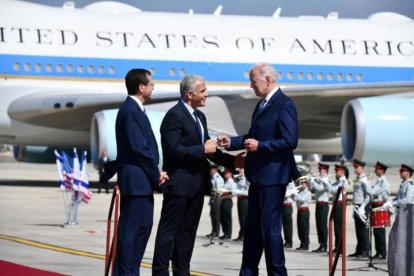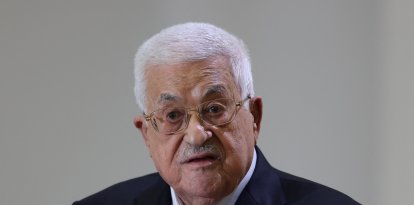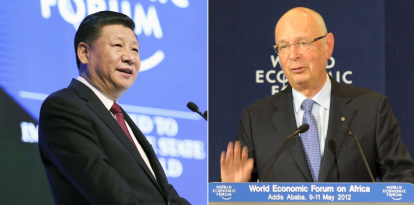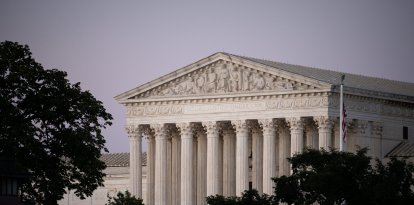Biden visits the old Middle East
Things have changed a lot in the area that the president will visit this Wednesday. It will depend on his mental dexterity to learn about the new board.

(GPO- Yad Vashem)
President Biden begins this week his first since he inaugurated his presidency in January 2021. The problem with this trip is that it is planned as a trip back in time. The Biden Administration is stuck in the old Middle East, in a regional map that ceased to exist years ago.
The first element of that old Middle East is the obligatory stop at the Palestinian Authority (PA). After six years in which both the Palestinian issue and PA leader Mahmoud Abbas had lost their centrality in the strategic affairs of the region, Biden rescues both the issue and the person from the past. He not only forgets the continuous Palestinian calls to end the State of Israel, but again confuses concessions with moderation.
All presidents before Donald Trump believed that it was necessary a peace agreement between Israel and the Palestinians in order to have a normalization of Israel and the Arab world. Likewise, everyone before Trump believed that such a peace agreement required giving more concessions to the Palestinians at the expense of Israel's security. And, on both assumptions, they were wrong. On the one hand, it is Iran, not a Palestinian state, that worries the Arab world; on the other, as Trump showed, the Palestinians make reasonable demands only under pressure. The more concessions, the more radical and ambitious they show themselves to be. Neither Biden nor the current Democratic Party have understood the lesson and continue to think of a Middle East in which everything revolves around the future Palestinian state.
Only under pressure do Palestinians make reasonable demands. The more concessions they make, the more radical and ambitious they become. Neither Biden nor the current Democratic Party have understood the lesson and continue to think of a Middle East in which everything revolves around the future Palestinian state.
The second element of that old Middle East that the White House retains in its imagination is shown by the itinerary adopted for this first presidential visit: Israel, PA and Saudi Arabia. Each stop has its own explanation, but as a whole, it is about reviving the dream of a region whose stability and security depends on America's goodwill. And if it was ever the case, it is clear that it is no longer. Possibly it all started with Obama's planned trip to the Far East and his hasty exit from Iraq in 2011.
Without having won and with a highly unstable country, the Obama Administration chose to leave rather than renegotiate the military presence in Iraq; then it came a more transactional policy pursued by Donald Trump, the fact that the United States was no longer dependent on Gulf oil, and finally, the flight from Afghanistan, in August 2021, and how it came about with the embarrassing spectacle of the abandonment of the West's local allies.
All this set of situations, attitudes and decisions forged a shared and generalized vision in the region, according to which America was no longer a reliable ally. And, in the specific case of Saudi Arabia, the Biden Administration's accusations against Crown Prince Mohammed bin Salman as the instigator of Kashogi's assassination, as well as the allegations of the lack of respect for human rights in Saudi Arabia, not only generated a rapid cooling of bilateral relations, but also sharpened Riyadh's sense of the need for autonomy from America.
It is hard to believe that the Middle East experts at Biden's disposal are unaware of the profound changes in the region in recent years. But it is perfectly conceivable that the White House prefers to believe in the Middle East that was - the one experienced by its top officials until the Obama era - rather than the current one, in which America is listened to but not followed.
The Iranian problem
There has perhaps been no issue where the United States has been more out of step with the major regional players than that of the Iranian nuclear program - and how to prevent an atomic Iran. Biden's team came to power with the idea of reviving an agreement like the one signed by Obama in 2015, a JCPOA 2.0, and has been negotiating in the background promising all kinds of concessions to the Tehran regime.
Iranian leaders have believed that America was surrendering at their feet and, encouraged by the American eagerness to sign an agreement, began to include in their demands things that even the White House could not secure. It began with changes in the anti-terrorism legislation to remove the Iranian Revolutionary Guard from the State Department's list of terrorist organizations. This was followed by the unconstitutional promise that the new agreement can never be modified by a subsequent Administration and ended with the demand that Washington put an end to Israeli strikes on Iranian targets in Syria and Iraq. It must be understood that, for the ayatollahs, the United States and Israel are a continuum and cannot act independently or sovereignly.
Despite increasing Iranian demands, and a White House whose main interest is to sign whatever it takes, regional leaders met with Secretary of State Blinken in what has been called the "Negev summit". Israel hosted the foreign ministers of the Emirates, Bahrain, Egypt and Morocco for the first time, and the main objective was to convey to the American side its concern about the possible signing of a bad agreement with Iran. Moreover, this summit has continued to develop, with the participation of Saudi observers, to establish itself as a new regional security framework in the face of the multiple threats posed by the Iranian regime. These threats range from nuclear to regional terrorism, including the development of long-range missiles and the sponsorship of revolutionary groups throughout the area.
Iranian leaders have believed that America was surrendering at their feet and, encouraged by American eagerness to sign an agreement, began to include in their demands things that even the White House could not secure.
In 2014 and 2015, when Obama was accelerating secret negotiations with Iran to reach the JCPOA agreement, many countries in the region privately expressed their discomfort at the benign treatment accorded to Iran, "the head of the snake", as one regional leader called it. The difference is that now, seven years later, there is a new - and very powerful - element to take into account: Israel's growing relations with all these countries. A normalization that was brought about by the Iranian threat and disbelief in US policies towards the region.
In fact, Biden would not have set foot in Saudi Arabia in the absence of the Russian invasion of Ukraine. He arrives in Riyadh to do what the presidents of the 1980s and 1990s always tried to do: regulate the flow of oil that the Kingdom puts on the international market in order to contain rising inflation. But what they used to get more or less thanks to promises of military protection, is no longer worth it.
This is the New Middle East that Joe Biden will get to know first hand. Whether he gets to know it or not, will depend on his mental acuity and the interests of his advisors, more installed in inertia than in reality.
RECOMMENDATION





















